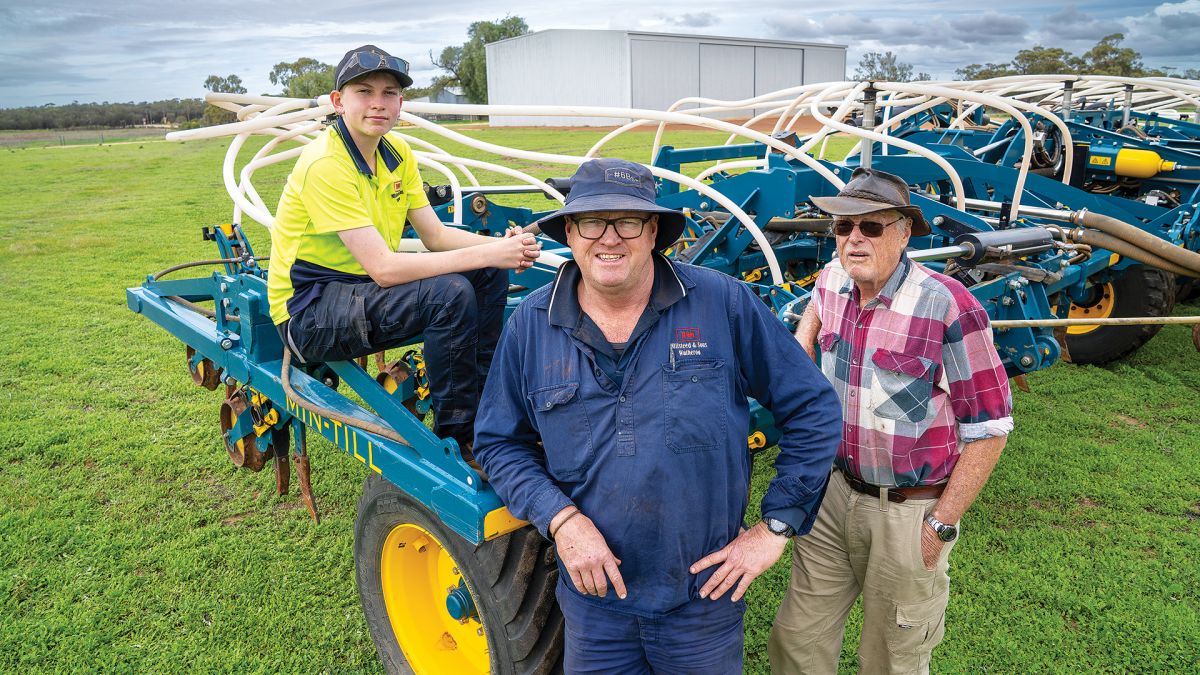A farm evolution and the power of connection

Bradley Millsteed (centre) with his son Dylan Millsteed and father Jeff Millsteed on their Watheroo, WA property. Photos: Evan Collis
Ten years can transform a farm, and a farmer. For Bradley and Denise Millsteed, whose Watheroo operation was first profiled in GroundCover’s grower series in 2015, the past decade has brought changes in business structure, farming practices and personal perspective.
The Millsteed enterprise, ‘Glenview’, remains mixed, but the balance has shifted. Cattle exited the system in 2017, sheep numbers have been halved, and the cropping program has become more opportunistic.
Barley features more heavily in the rotation, as Bradley searches for profitability amid challenging lupin yields.
Bradley says they usually retain about 100 t a year of lupins for sheep feed and seed for the next crop and sell the rest, but 3 years ago they delivered just 7 t.
“There’s more barley in the system now, because lupins are just not doing what they should be doing for us,” he says.

For Bradley Millsteed, the past decade has brought changes in business structure, farming practices and personal perspective.
“If we weren’t running sheep, I’d struggle to grow them outside of the fact that I need a rotation in the sand plain to hold it together. Barley has also helped cover some areas that opened up during the drier years.”
Bradley’s approach to climate variability is pragmatic. He notes that rainfall patterns at ‘Glenview’ have changed, and average annual rainfall has declined in the past 5 to 10 years, but not starkly.
The 2015 season was marked by early dry periods offset by bursts of heavy rain and “the driest September in recent history”.
At the time, after the Millennium Drought in the early 2000s, Bradley said they had become more reactive growers, playing seasonal conditions rather than blindly following a prescribed plan.
It’s a philosophy he still follows and one that helped in 2023 when Watheroo, like many parts of WA, again received below-average rainfall.
“We still make our plan so we’ve got a blueprint to work from, but, when need be, we will drop non-profitable paddocks,” Bradley says.
Investment in new machinery, deep ripping and precision mapping, along with adopting dry sowing, has helped manage costs and adapt to seasonal uncertainty.
A management restructure will provide a pathway for Bradley and Denise’s teenage son, Dylan, to return to the farm when he’s finished his education.
Beyond the farm gate, Bradley has become a driving force behind #6Bs – blokes, BBQ, bonfire, beers, bonding and bullshit – a grassroots men’s mental health initiative that began with a bonfire, barbecue and conversation and has since spread across WA and interstate.
The format is simple, but the impact of standing around a fire and having a yarn has been profound.
“It’s quite common to have somebody come up to you during the night and say, ‘Thanks for organising this. I was becoming a real grumpy bastard at home. I really, really needed this and I’m so glad I’ve come’,” he says.
This article appeared in GroundCover
Further reading: Changing climate drives farm business transformation
